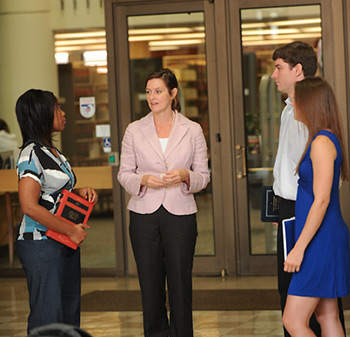


Desiree Hensley
In situations where Mississippians need legal help but can’t afford it, the UM Civil Legal Clinic is doing its part to fix the problem while preparing the next generation of Mississippi lawyers to blend public interest practice into their legal careers.
Operating as a class in which students can enroll for credit, gain professional experience and learn how to apply the theories they have learned in the classroom, the Civil Legal Clinic is also a public service, offering legal expertise to Mississippians who aren’t able to pay for representation.
In Mississippi, where there is one legal services provider for every 18,000 potential clients, that means the UM Civil Legal Clinic has served a wide scope of needs, from helping families with domestic violence cases to providing legal assistance to business owners, and even working hand-in-hand with lawmakers to establish more equitable policies for all Mississippians.
“What is constant in the clinic’s work is a commitment to helping individuals who are facing significant legal problems and can’t afford an attorney, and providing a service to the state as a whole,” said Desiree Hensley, assistant professor of law and director of civil law.
Each year, about 60 students work in the clinic with Hensley, the clinic’s director and only full-time faculty member, as well as with five other lawyers, some of whom are Ole Miss staff supervisors and some who are local attorneys. With three additional support staffers, the clinic acts as its own “law firm within the law school.”
Clinic topics vary from semester to semester and stem from identified needs. Over the years, clinics have focused on housing, domestic violence, child advocacy, elder law and more. A partnership with North Mississippi Rural Legal Services has helped extend the clinic’s reach. Besides serving clients, the clinic fields questions from hundreds of people annually, offering advice even in cases where it cannot commit to representation.
 “We’re working with that entity or person to figure out how we can do things better in Mississippi – how we can alleviate poverty, how we can meet unmet needs – and trying to use our skills and resources as lawyers and as a law school to help,” Hensley said. “Our institution and our law school, being the public law school institution in the state, should be something that the state can rely on to create positive change.”
“We’re working with that entity or person to figure out how we can do things better in Mississippi – how we can alleviate poverty, how we can meet unmet needs – and trying to use our skills and resources as lawyers and as a law school to help,” Hensley said. “Our institution and our law school, being the public law school institution in the state, should be something that the state can rely on to create positive change.”
The clinic has leveraged its resources by making use of the expertise available across the UM campus and by offering services through interdisciplinary partnerships. For example, to help a housing client whose home is being destroyed by water damage, Hensley enlisted Cristiane Surbeck, assistant professor of civil engineering, to provide the engineering expertise needed to advise the client. Hensley hopes partnerships with the McLean Institute for Public Service and Community Engagement will also leverage resources to support change in the state.
The clinic also has partnered with Insight Park, the university’s research park, to provide legal services such as entity formation to the park’s tenants. That assistance is part of a much broader focus on transactional law at the clinic. In recent years, the transactional clinic has been popular among students, who are attracted to the opportunity to gain businesses law-related experience while providing a service to the state and its people.
The mission of the transactional clinic is to foster the economic development of diminished communities in the state and Delta region by providing tools and knowledge to low-capital entrepreneurs and not-for-profits. A recent transactional clinic project involves changing policy by recognizing food resources as an economic development issue. By supporting an agricultural-based economy in the Delta, the clinic hopes to foster community development.
Its first step is a fact-finding mission to recognize what already exists in the area. From there, the clinic can provide businesses assistance to those people already selling food in the Delta, from a woman who sells cakes at church to the farmers who have roadside stands. The clinic is collaborating with the UM Department of Sociology and John Green, director of the Center for Population Studies, on this long-term policy objective.
Previous policy directives have been diverse. The examples are many: the clinic assisted the Mississippi Department of Health with a program to prevent childhood lead poisoning; it spearheaded the creation of a post-Katrina legal relief manual; and it provided the legwork that led to Mississippi’s residential landlord-tenant act by drafting legislation. The clinic was instrumental in changing Mississippi family law to better protect children in divorce custody battles by creating a presumption that a parent who has been charged with domestic abuse should be less likely to be awarded child custody. Current policy-related issues include protecting senior citizens’ rights and reforming the school-to-prison pipeline that results from flaws in the juvenile justice system.
All the clinic’s policy-directed projects share a common goal: to help Mississippi’s legal system at its roots. Hensley is driven as much by teaching and policy work as she is by helping people who are in desperate legal situations.
“Helping an individual deal with an eviction helps that person, but helps them in a way that is almost a Band-Aid,” she said. “It’s covering a wound, coming in after the injury and trying to make it better than it otherwise would be. But when you’re doing the policy work and working with the students, you’re doing preventative medicine.
“I’m very driven to get to the root causes and also to reach students so that they, too, realize that being a lawyer is about supporting your community and supporting your state, to deal with these problems on the front end. As a law school, we have a duty to train our students to think of these as systemic issues and not just issues that plague certain people, but often arise in the challenges of our state.”
Hensley’s students have taken those experiences to heart. Emily Ratliff, a 2010 law school graduate, spent three semesters working with the Child Advocacy Clinic and continued to volunteer on some projects after graduation. A practitioner in disability law, Ratliff credits her time in the clinic with giving her practical work experience as well as forming a broader understanding of the responsibilities of serving in the legal profession.
“I learned so much about the struggles low-income Mississippians face due to their limited access to legal services,” Ratliff said. “My time in the Child Advocacy Clinic not only taught me legal advocacy skills, but also the role compassion has to play in being a good advocate.”



